Guinea pigs make wonderful pets, and it’s only natural to want to feed them a variety of foods to keep them healthy and happy. However, it’s essential to be aware of what foods are safe for them to eat and what foods can be harmful. One common question that many pet owners have is whether guinea pigs can eat carnations. In this guide, we will explore the nutritional content of carnations and whether they are a safe option for your furry friend.
Key Takeaways:
- Guinea pigs require a balanced diet that includes fresh vegetables, high-quality hay, and pellets formulated for their specific nutritional needs.
- While some plants are safe for human consumption, they may not necessarily be safe for guinea pigs.
- It is always best to consult with a veterinarian before introducing any new foods to your pet’s diet.
- Carnations are not recommended for guinea pigs, but there are alternative safe and enjoyable floral treats for your guinea pig.
- Maintaining a balanced and species-appropriate diet is key to ensuring the health and happiness of your guinea pig.
Understanding Guinea Pig Diets
Guinea pigs have distinct dietary needs that must be met to maintain optimal health. A balanced diet that includes fresh vegetables, high-quality hay, and pellets formulated for their nutritional requirements is necessary. Including a variety of foods in your guinea pig’s diet is essential to ensure that they receive all the vitamins and minerals necessary for healthy growth and development.
Guinea pigs should have access to fresh water at all times, and their food should be of high quality and free of any mold or contaminants. Avoid feeding your guinea pig any foods that are high in fat, sugar, or salt, as these can lead to health problems such as obesity, dental issues, and digestive irregularities.
- Fresh Vegetables: Offer a variety of fresh vegetables, such as kale, spinach, romaine lettuce, carrots, bell peppers, and cucumbers.
- High-Quality Hay: Hay should make up the bulk of your guinea pig’s diet, as it provides essential fiber to aid in digestion and prevent dental issues. Timothy hay is an excellent choice for your pet.
- Pellets: Pellets formulated specifically for guinea pigs should be used to supplement their diet and provide additional essential nutrients.
By offering a balanced and varied diet, you can ensure that your guinea pig receives all the necessary nutrients to lead a healthy life.
Common Foods for Guinea Pigs
Guinea pigs are herbivores and require a diet rich in fiber, vitamins, and minerals. A varied diet is essential for their overall health and well-being. Let’s explore some common foods that are safe for guinea pigs:
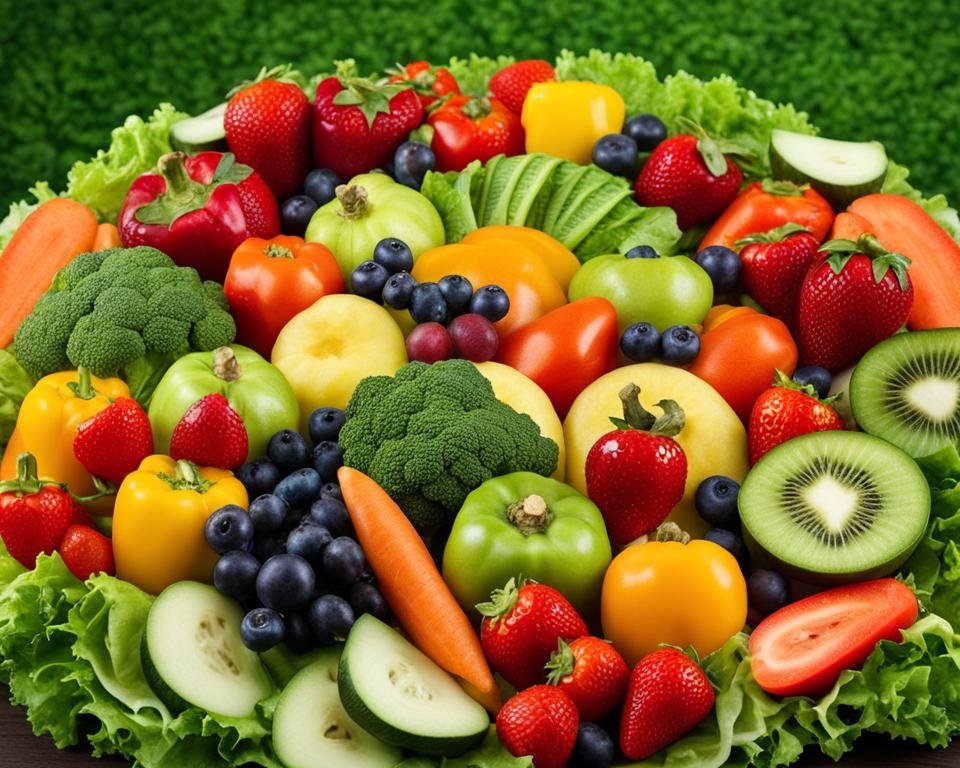
Hay
A high-quality hay such as timothy, orchard, or meadow hay should be the foundation of your guinea pig’s diet. Hay provides essential fiber that helps maintain digestive health and wears down their continuously growing teeth.
Pellets
Guinea pig pellets are designed to provide the necessary nutrients that hay alone may not provide. Pellets should be of good quality and formulated specifically for guinea pigs, not other small animals.
Vegetables
Providing fresh vegetables can be an excellent way to add variety to your guinea pig’s diet. Some safe and recommended options include:
- Romaine lettuce
- Kale
- Cucumber
- Bell peppers
- Zucchini
- Carrots (in moderation due to their high sugar content)
Fruits
Fruits should only be given in moderation due to their high sugar content. Recommended options include:
- Strawberries
- Blueberries
- Apples (remove seeds and core)
- Pears (remove seeds and core)
It’s important to introduce new foods slowly and in small quantities to prevent digestive upset.
Carnations and Guinea Pigs
Guinea pigs are herbivores and require a balanced diet rich in fiber, vitamins, and minerals to maintain optimal health. When it comes to feeding guinea pigs, we need to be mindful of foods that could harm their digestive system and overall well-being. Carnations, known for their elegant beauty, are not a recommended food for guinea pigs.
Carnations do not offer any nutritional benefits for guinea pigs, and they are known to cause digestive problems such as bloating or diarrhea. While small amounts of the flower are not likely to be harmful, it is best to avoid feeding them to your guinea pig entirely.
Furthermore, carnations and other flowers purchased from stores can contain pesticides or other chemicals harmful to guinea pigs. Therefore, it is best to stick to feeding your guinea pig fresh vegetables, high-quality hay, and pellets formulated specifically for their dietary needs.
If you notice any changes in your guinea pig’s behavior or stool after feeding them a new food, consult with your veterinarian immediately. These signs could indicate a more severe underlying health issue that requires prompt medical attention.
Potential Risks of Feeding Carnations to Guinea Pigs
As mentioned in the previous section, carnations are not recommended for guinea pigs. In fact, feeding them to your furry friend may cause several potential risks and adverse effects on their health.
- Upset Stomach: Carnations contain saponins, which can cause gastrointestinal distress and lead to diarrhea or nausea in guinea pigs.
- Toxicity: Certain varieties of carnations contain toxic compounds, such as glycosides, that can cause poisoning in guinea pigs. Symptoms may include vomiting, lethargy, and difficulty breathing.
- Allergy: Some guinea pigs may have adverse reactions to carnations due to their potent fragrance, which can trigger respiratory or skin-related issues.
Therefore, it is best to avoid feeding carnations to guinea pigs and stick to a diet that is safe, balanced, and appropriate for their nutritional needs.
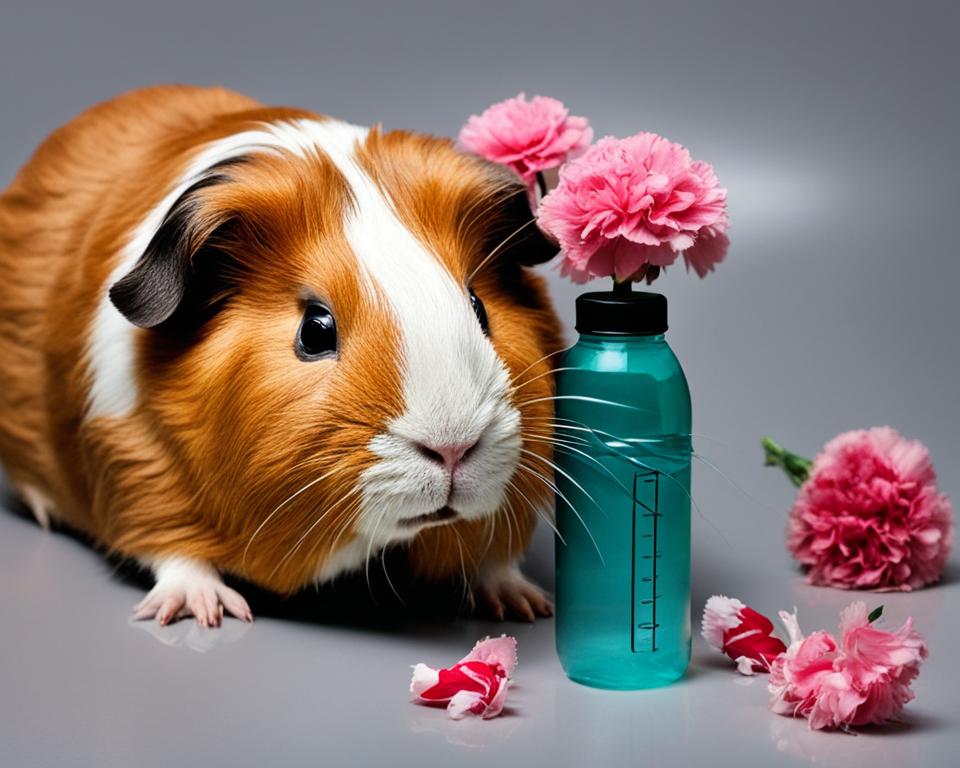
Ensuring a Healthy Diet for Guinea Pigs
Guinea pigs require a well-balanced and nutritious diet to maintain optimal health and prevent illnesses. A healthy meal plan for your furry friend should consist of high-quality hay, fresh vegetables and fruits, and fortified pellets that meet their specific nutritional requirements.
When creating a meal plan for your guinea pig, keep in mind the importance of moderation and variety. Overfeeding or underfeeding can lead to health problems, and offering the same foods repeatedly can cause a loss of interest in mealtime.
Try offering a variety of vegetables and fruits in small amounts, alternating them regularly to keep your guinea pig engaged. As a general rule, aim to provide about one cup of fresh vegetables per two pounds of body weight daily.
Hay
Hay is an essential part of a guinea pig’s diet, as it provides the necessary fiber for digestive health and helps wear down their constantly growing teeth. Choose high-quality hay that is free of dust, mold, and any other contaminants.
Pellets
Pellets should also be a part of your guinea pig’s diet, as they provide necessary vitamins and minerals. However, it is important not to overfeed pellets, as they can lead to obesity and other health problems. Offer pellets formulated specifically for guinea pigs, and limit the amount to about 1/8 to 1/4 cup per day for an adult guinea pig.
Water
Ensure your guinea pig has access to clean, fresh water at all times. Use a water bottle with a sipper tube to prevent spills and maintain sanitation.
Overall, a healthy diet for guinea pigs consists of a balanced combination of hay, pellets, and vegetables and fruits. Consult with a veterinarian for personalized advice and guidance on your guinea pig’s dietary needs.
Alternative Flowers for Guinea Pigs
While carnations may not be the best floral treat for guinea pigs, there are many other safe and enjoyable flowers that they can indulge in. Here is a list of alternative flowers that are safe for guinea pigs to consume:
- Marigolds
- Roses (petals only)
- Hibiscus
- Pansies
- Nasturtiums
It is essential to note that while these flowers are safe for guinea pigs, they should be given in moderation to avoid disrupting their diet’s balance. Additionally, always ensure that any flowers that you offer your guinea pig are pesticide-free and thoroughly washed.
Adding variety to your guinea pig’s diet can be a fun way to keep them happy and entertained. As always, it is important to seek guidance from a veterinarian before introducing any new foods to your pet’s diet.
Consulting a Veterinarian
If you’re unsure about your guinea pig’s dietary requirements, or if you want to introduce new foods to their diet, it is essential to consult with a veterinarian. An experienced veterinarian can provide personalized advice and recommend suitable dietary options for your guinea pig’s unique needs, ensuring their optimal health and well-being.
Regular veterinary check-ups are also crucial to maintaining your guinea pig’s overall health. During these check-ups, your vet can assess your pet’s dietary needs and provide any necessary guidance on how to adjust their diet to ensure they are receiving all the nutrients they require.
Remember that every guinea pig is different, and there is no one-size-fits-all dietary plan that will work for every pet. Seeking professional advice and guidance from a veterinarian is the best way to ensure your guinea pig is getting the right nutrition they need to thrive.
Conclusion
After exploring the nutritional content of carnations and potential risks associated with feeding them to guinea pigs, it is best to avoid offering this flower to your furry companion. While guinea pigs can enjoy a diverse range of foods, including vegetables and fruits, it is essential to ensure that they are safe and nutritious for them. As a responsible pet owner, it is crucial to consult with a veterinarian for personalized advice regarding your guinea pig’s dietary requirements and seek professional guidance before introducing any new foods to their diet. By maintaining a balanced and species-appropriate diet, you can ensure the health and happiness of your guinea pig for years to come.
FAQ
Can guinea pigs eat carnations?
No, it is not safe to feed carnations to guinea pigs. Carnations are not part of their natural diet, and they can potentially cause digestive issues or even be toxic to guinea pigs.
What should be included in a guinea pig’s diet?
A guinea pig’s diet should consist of fresh vegetables, high-quality hay, and specially formulated pellets. It is important to provide a balanced and varied diet to meet their nutritional needs.
What are some safe and beneficial foods for guinea pigs?
Guinea pigs can safely eat a variety of vegetables, such as lettuce, bell peppers, and carrots. They can also enjoy fruits like apples and strawberries in moderation. Always introduce new foods gradually and monitor their response.
Are there any risks in feeding carnations to guinea pigs?
Yes, feeding carnations to guinea pigs can pose risks to their health. Carnations may contain chemicals or substances that can be harmful to guinea pigs. It is best to avoid offering them this flower.
How can I ensure a healthy diet for my guinea pig?
To ensure a healthy diet for your guinea pig, provide a balanced mix of hay, pellets, and fresh vegetables. Offer a variety of foods to ensure they receive all necessary nutrients and consult with a veterinarian for specific dietary recommendations.
Are there alternative flowers that guinea pigs can safely enjoy?
Yes, there are safe flowers that guinea pigs can enjoy, such as dandelion greens, chamomile, and marigold petals. Always research and double-check the safety of any flowers before offering them to your guinea pig.
Should I consult a veterinarian regarding my guinea pig’s diet?
Yes, it is advisable to consult with a veterinarian for personalized advice on your guinea pig’s dietary needs. A veterinarian can provide guidance on appropriate portion sizes, introduce new foods, and monitor their overall health.

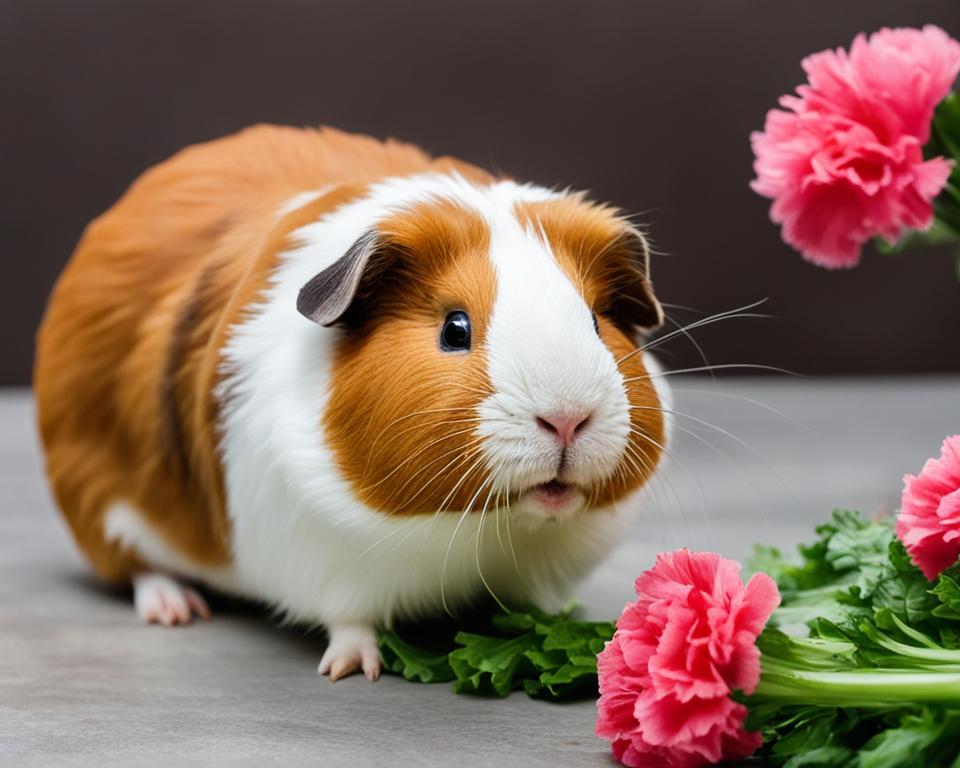
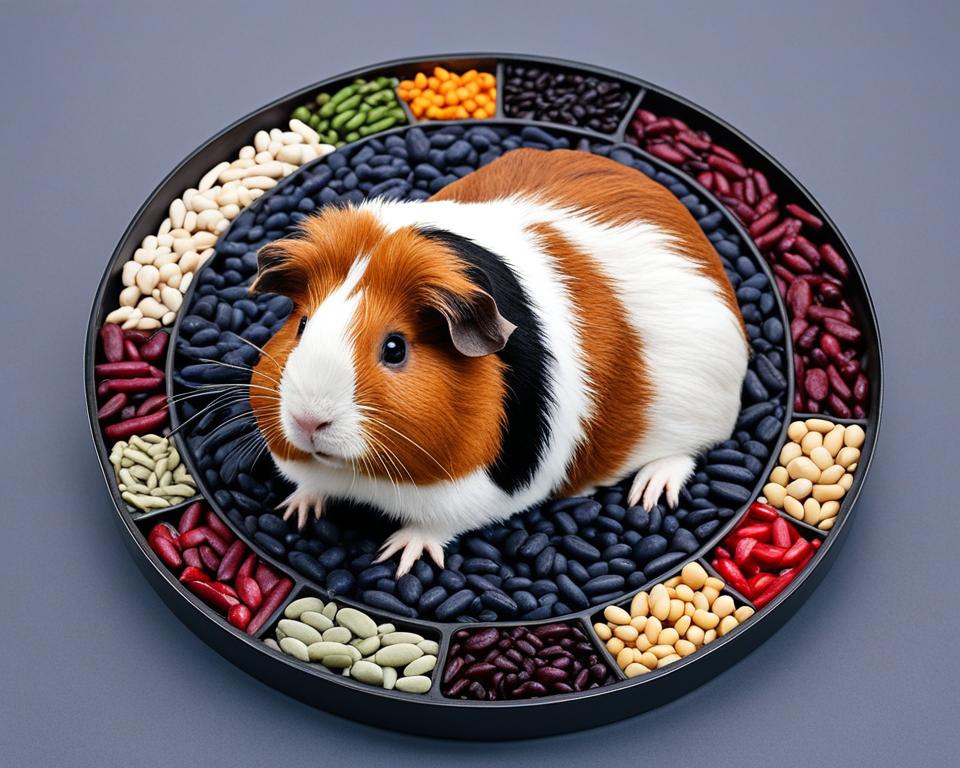
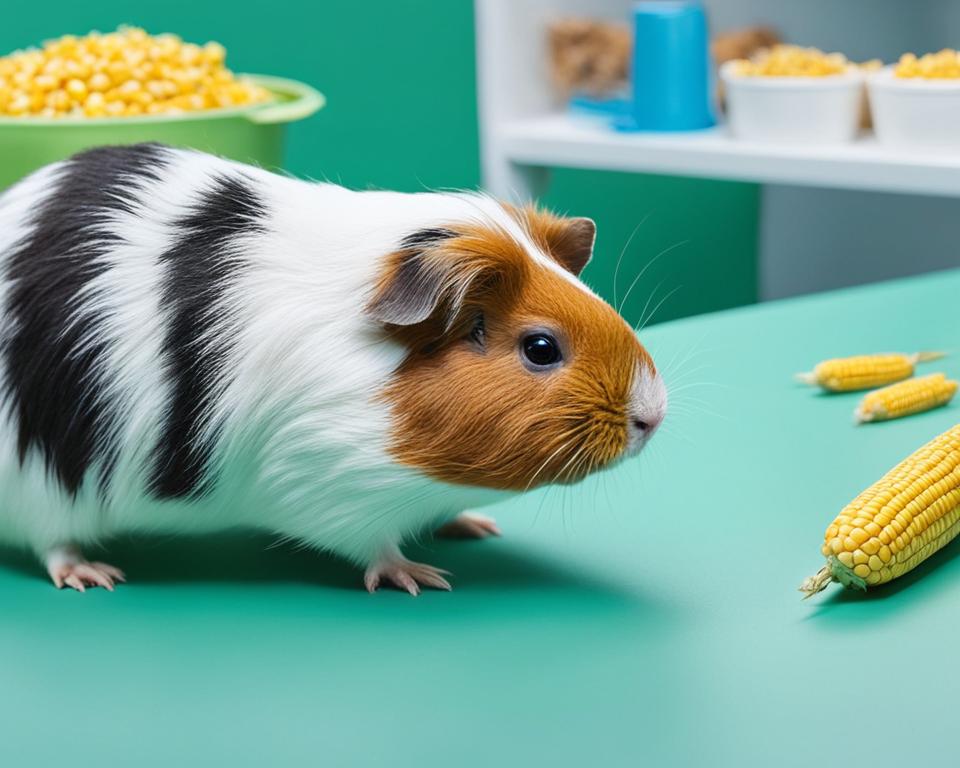
Leave a Reply